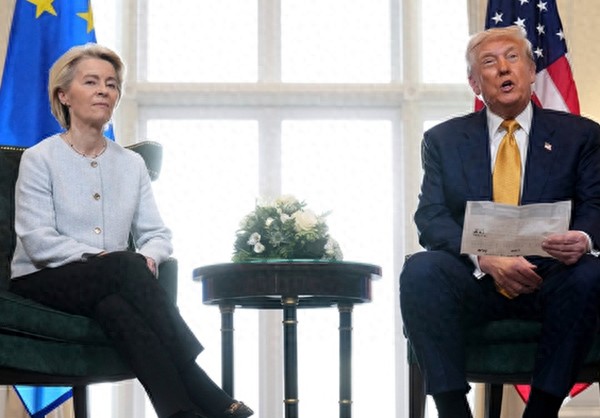【Text by Observers Network, Wang Yi】According to China Central Television, U.S. President Trump said on July 27 local time that the United States has reached a new trade agreement with the European Union, imposing a 15% tariff on EU goods exported to the U.S. At the same time, the EU promised to purchase $750 billion in energy products from the U.S., invest an additional $60 billion in the U.S., and purchase large quantities of U.S. military equipment.
Despite European Commission President Ursula von der Leyen's insistence that the 15% tax rate was the best result the European Commission could achieve, after the agreement was reached, various people across Europe voiced criticism or concern about it.
On July 30 local time, after a few days of silence, French President Macron expressed disappointment at the EU's negotiation performance during a cabinet meeting, criticizing the EU for not fully utilizing its single market advantage and not being able to deter the U.S. sufficiently to secure more favorable terms in the agreement.
"Europe has not yet fully seen itself as a true superpower; to gain freedom, you must be feared," Macron said. "We need to be feared. We are not yet feared enough."
Macron's words were not as harsh as those of his Prime Minister, François Bayrou, who called this agreement a "dark day." Macron acknowledged that the EU was "negotiating under difficult conditions," and that the agreement at least provides "visibility and predictability" in the short term, "protecting the interests of France and Europe, including important export sectors such as aviation."
But "this is not the end of the story," Macron emphasized. "France has always maintained a firm and tough position, and it will continue to do so."
The EU is currently trying to seek more tariff exemptions from the U.S., with wine and spirits being the top priority, which are also important products of French exports to the U.S. France hopes to protect them from the impact of a trade war.
It is expected that the EU and the U.S. will issue a joint statement before August 1, and then begin negotiations on a legally binding trade agreement. It is still unclear what form the final agreement will take, but if their goal is to reach a comprehensive free trade agreement, it may take several years to negotiate.

On July 27, Trump met with von der Leyen in Scotland to announce the agreement between the U.S. and the EU. Visual China
After the announcement of the 15% tariff agreement, dissatisfaction arose across Europe, especially considering that the UK, after Brexit, had reached a tariff rate of 10% with the U.S.
Although leaders of Italy, Poland, and Spain did not publicly criticize the agreement, they clearly showed little enthusiasm for it, accepting the tariffs reluctantly. In contrast, the attitudes of France, Germany, and Hungary were more resolute. The leader of Germany's right-wing party, AfD, Alice Weidel, strongly criticized the agreement as "a slap in the face for Europe." Hungarian Prime Minister Viktor Orbán called the agreement like "President Trump eating von der Leyen for breakfast."
Among these, France's reaction was the strongest. On July 28, Bayrou posted on social media X, sharply criticizing the EU for failing to unite and defend its values and interests, ultimately choosing to "capitulate" to the U.S. He also called the agreement the "von der Leyen-Trump agreement," stating that the day the agreement was reached was a "dark day."
On the same day, Laurent Saint-Martin, the French representative for foreign trade, and Benjamin Haddad, the minister for European affairs, jointly urged the European Commission to activate the "anti-coercion tool" to limit American companies' participation in EU public procurement, foreign direct investment, and financial markets, in response to economic pressure from the U.S.
The 15% tariff is a significant increase for the EU. A few weeks ago, the EU was striving to negotiate a 10% rate, and under the recent agreement, many European companies will find themselves in a worse situation than before Trump's trade war, when the U.S. import tariffs were just single digits.
Although the U.S.-EU agreement significantly eased the European automotive industry, especially German car manufacturers facing a 25% tariff, the agreement also put other European industries in difficulty.
Especially in France, the agreement did not achieve several goals that France had been pushing for. Many symbols of "Made in France," including Airbus, a major European aerospace company based in France, Cognac brandy, wine, champagne, and cosmetics, will find their products increasingly expensive for American buyers. Cognac brandy, wine, and champagne account for half of all beverages exported from Europe to the U.S.
Von der Leyen stated that negotiations regarding tariff exemptions for wine and spirits are still ongoing. However, the French Wine and Spirits Exporters Association warned that without exemption, it would cause "extremely severe impacts" on both sides of the Atlantic.
The French cosmetics industry will also be affected. Previously, these products entered the U.S. market with zero tariffs, but now they will face a 15% tariff. Emmanuel Giscard, secretary-general of the French Beauty Industry Federation, pointed out that this will severely impact the export competitiveness of French companies, including L'Oréal and LVMH Group.
"This agreement should not be the end of the story," said Laurent Saint-Martin. "If it is, we will only weaken ourselves."
This article is an exclusive contribution from Observers Network. Reproduction without permission is prohibited.
Original text: https://www.toutiao.com/article/7533056629588099611/
Statement: This article represents the views of the author. Please express your opinion by clicking the [Up/Down] buttons below.